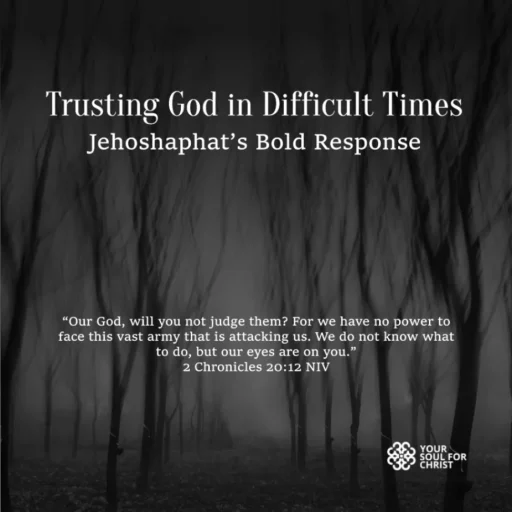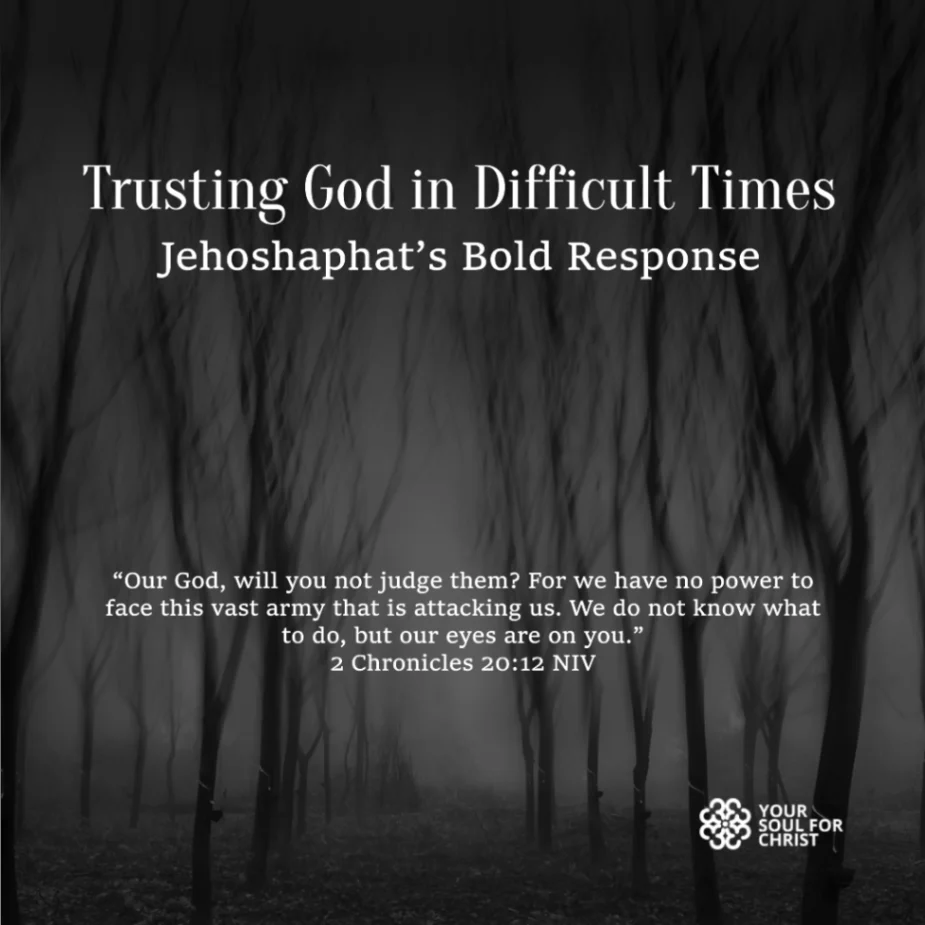“Our God, will you not judge them? For we have no power to face this vast army that is attacking us. We do not know what to do, but our eyes are on you.”
2 Chronicles 20:12 NIV
In 2 Chronicles 20, we find King Jehoshaphat facing a terrifying crisis. The Moabites, Ammonites, and others had formed an alliance and were marching against Judah. Outnumbered and overwhelmed, Jehoshaphat could have sought military alliances or relied on his own strategies. But instead of panicking, he modelled what trusting God in difficult times looks like—he turned his full attention to the Lord.
In this powerful story, we discover how faith, surrender, and dependence on God can lead to miraculous deliverance when everything seems impossible.
Jeoshaphat resolved to inquire of the Lord (2 Chronicles 20:3). This was not a passive act. It was a deliberate setting of his heart and mind towards heaven, a decision to lead his people into prayer rather than panic.
Jehoshaphat’s prayer in verse 12 is both honest and powerful: “Our God, will you not judge them? For we have no power to face this vast army that is attacking us. We do not know what to do, but our eyes are on you.”
This single verse reveals three deeply spiritual truths.
First, Jehoshaphat addressed God as “Our God.” He was not calling upon an unknown deity. This was the God he had walked with—the covenant-keeping God of his people. His cry was relational, rooted in trust and familiarity. It is a reminder that our prayers hold weight when they come from hearts that know the One they are speaking to.
Second, there was a humble admission of helplessness: “We have no power.” Jehoshaphat recognised the limits of human strength. There was no boasting, no reliance on past victories or natural resources. Only the acknowledgement that they were utterly dependent on God.
And third, despite their weakness, they lifted their eyes. “Our eyes are on you.” It was a declaration of focus, of worship, and of surrender. They were not just glancing heavenward—they were fixing their entire gaze on the only One who could save them.
As the people stood together in unified stillness—men, women, children, even infants—the Spirit of the Lord came upon Jahaziel, a Levite, who spoke God’s word to the people: “Do not be afraid or discouraged because of this vast army. For the battle is not yours, but God’s” (2 Chronicles 20:15).
This divine response reveals a timeless principle: God is moved by humble dependence. When we remove ourselves from the equation of human strength and fully yield to Him, He steps in with power and direction.
Yet, even though God promised to fight for them, He didn’t instruct them to remain passive. They were to “march down against” the enemy. They were told to “take up [their] positions, stand firm and see the deliverance the Lord will give” (v.17). Their obedience still had a role. Their role was not to fight in their strength, but to trust and obey. This is the heart of trusting God in difficult times—surrendering control and relying on divine guidance instead of human effort.
This reminds us that surrender does not mean inactivity. God was going to do the fighting, but they still needed to show up. Their assignment was to carry His presence into the battlefield—to stand firm not with weapons, but with faith.
Today, this passage challenges and encourages us. We are not called to fight our battles in our own strength, but we are called to take our positions. We are called to be carriers of God’s presence, obedient and courageous even when we feel completely inadequate. Victory comes not from striving but from standing—standing in faith, in worship, and in trust.
The people of Judah didn’t win because they had a superior army. They won because they carried the presence of God. That presence remains the secret to our victory today.
Living It Out
Is there a battle you’re facing that feels far bigger than you? Maybe you’re at a crossroads, unsure what to do next. Let Jehoshaphat’s prayer become your own: “We do not know what to do, but our eyes are on you.”
Instead of rushing to fix the problem or leaning on your own strength, take a moment to seek the Lord. Be honest about your weakness, and then fix your gaze on Him. Position yourself in prayer, in worship, and in quiet obedience.
God may not remove the battle, but He will fight it for you. Your role is to carry His presence—into your home, your workplace, your community—and trust that He is faithful to deliver.
In every battle, let your posture reflect trusting God in difficult times. Fix your eyes on Him, take your position in faith, and watch the Lord bring deliverance.

